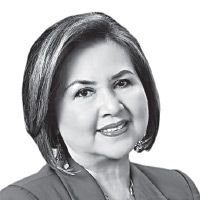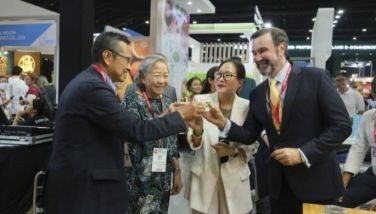How the UN country team is helping GMA’s 10-point goal

July 15, 2004 | 12:00am
Ms. Deborah Landey, the new UN Resident Coordinator and UNDP (United Nations Development Programme) Resident Representative in the Philippines, together with her UN "family team" called on me as UNESCO Secretary-General and my UNESCO Executive Committee of 12 commissioners at the Department of Foreign Affairs. The meeting was chaired by DFA Secretary Delia Albert’s assistant, Ambassador Melody Lopez, who also heads the UNIO (United Nations International Organization). It was in preparation for today’s official global launching of the UN Human Development Report of the United Nations Secretary General Kofi Annan.
Ms. Landey, who also coordinates the UN operational activities for development in the Philippines, enthusiastically observed that "the ten-point program of President Gloria Macapagal Arroyo fully reflects the commitment of the Philippines to achieve the Millennium Development Goals or MDG".
Ms. Landey recalled that in 1997, the UN Secretary-General launched a reform programme to prepare the United Nations for the challenge of the 21st century. These reform initiatives emphasized the role of the United Nations in developing a powerful set of standards and goals arising out of UN conventions and global conferences. Several measures were proposed to enhance the organization’s capacity to implement its development mandate, PARTICULARLY AT THE COUNTRY-LEVEL.
To forge the partnership of her UN "family team" with the UNESCO National Commissioners, Ms. Landey introduced her team who came: UNICEF representative Dr. Nicholas A. Alipui, International Finance Corporation Country Manager Mr. Vipul Bhagat, WHO representative Dr. Ramas Veloyudhan, ILO Manila representative Carmela I. Torres, FAO Manila representative Arcadio Cruz, UN High Commissioner for Refugees Officer-In-Charge Atty. Rico Salcedo, International Maritime Organization Regional Coordinator Atty. Brenda Pimentel, UN-Habitat Lowie Rosales, UN Information Center Officer Sylvia Oliver-Inciong, and UNDP Resident Coordinator Adviser Anna Senga.
The Common Country Assessment (CCA) and the UN Development Assistance Framework (UNDAF) are integral parts of the UN Secretary-General’s initiative. This CCA represents a common instrument of the United Nations to analyze the national development situation of the Philippines and to identify key development issues. The Philippine country assessment is matched by the UN Development Assistance Framework to meet the eight UN Millennium Development Goals.
In September 2000, the Philippines was one of 189 Member States of the United Nations who adopted the Millennium Declaration. During the Millennium Summit, they confirmed their commitment to peace and security, respect for human rights, good governance and human development. The Millennium Declaration also committed the Member States to target the Millennium Development Goals until 2015 that will at least ensure that development initiatives are effectively eradicating poverty and promoting sustainable human development.
To eradicate extreme poverty and hunger, the target is to halve, between 1990 and 2015, the proportion of people whose income is less than one dollar a day. President Arroyo has committed six million jobs in six years.
As of 2000, about 34 percent of Filipinos are living below the national poverty line. Thirty-one provinces have poverty incidence of 40 percent or more, while 13 provinces (CAR, ARMM and Bicol) with 50 percent or more people.
The MDG also targets to halve the proportion of people who suffer from hunger. Malnutrition still poses a major threat to the Filipino child’s survival. The percentage of underweight children aged zero to five years old decreased only by an average of 0.3 percent per year from 34.5 percent in 1990 to 32 percent in 1998.
Assuring the employment within six years of the president’s governance, six million Filipinos would require the skill training of 12-year old elementary school graduates in technical high school, which ideally should extend one or two more years of on-the-job training in various factories and companies. Generally, most of these are 18-year old Filipinos.
UNESCO Education Committee Chairperson Linda Pefianco, who is also the Executive Director of SEAMEO-INNOTECH, informed the UN team of the Philippine proposal to put up the Regional Center for Lifelong Education. It refers to a lifelong educational goal of sustainable development conditioning for independence from infant education, quality elementary schooling to professional high school whose graduates would easily qualify for employment. Using result-based alternative approaches in education recognized by the Department of Education, TESDA and CHED, it would inject the quality long-missed in the public school system.
To achieve the goal of universal primary education, the target is ensuring that by 2015, children everywhere, boys and girls alike, will be able to complete a full course of primary schooling. The school participation rate in the elementary level increased from 85.1 percent in 1991 to 96.9 percent in 2000. Thus, we are on track.
BUT, there is still a formidable task ahead in reducing discrepancies between schools in rural and urban areas as well as the indigenous communities. We should take note that THE PROBLEM IS NOT ACCESS BUT HOW TO RETAIN CHILDREN IN SCOOL TO ENSURE COMPLETION AT ELEMENTARY LEVEL or HOW TO PREVENT THE SERIOUS DROP-OUT PHENOMENON AMONG FIRST-GRADERS.
The Social and Human Science Committee Chairperson Mrs. Felice Sta. Maria advocates the upgrading of the Basic Education curriculum. Four manuals have been printed and funded by UNESCO on the reform of the Social Studies curriculum. Thus, linkage with the Communication Committee headed by its chairperson Dr. Florangel Braid is being made to do a workshop for journalists and writers of textbooks.
The Philippines is on track for these two goals.
MDG Goal 3 promotes gender equality and empowerment of women. Women and men in the Philippines have equal status, especially in education outcomes where there is near gender parity.
The target of MDG Goal 6 is to halt HIV/AIDS, malaria and other diseases by 2015. Younger women, who are mostly sex workers, are at risk of HIV/AIDS. An increasing number of OFWs are also infected. As a result, it is observed that more children are born with HIV/AIDS. Meantime, the incidence in the country of malaria and other major diseases remains one of the highest in the world, with 75 Filipinos dying everyday. Malaria is still one of the 10 leading causes of illness. However, there are excellent tuberculosis and anti-malaria programs in the country.
The target for MDG Goal 4 is to reduce by two-thirds the under five years old mortality rate. Under-five mortality rate significantly declined from 80 per 1000 births in 1990 to 48 in 1998. While the reduction of under-5 mortality rate by two-thirds in 2015 is a high target for the Philippines given the current rate of progress.
For MDG Goal 5 of improving maternal health, the target is to reduce by three-quarters the maternal mortality rate. Deaths of women during pregnancy or at childbirth slowly decreased from 209 per 100,000 live births in 1990 to 172 per 100,000 live births in 1998.
Thus, MDG Goal 4 and Goal 5 are likely to be achieved.
To ensure environmental sustainability, the target is to integrate the principles of sustainable development into country policies and programs as well as reverse the loss of environmental resources. The four key areas are reforestation, bio-diversity protection, renewable energy and reduction of carbon dioxide emissions.
The Science and Technology Committee Chairperson Mrs. Leonarda Camacho gave an Environmental Audit Report wherein 1600 mayors and 79 governors responded. The survey identified 205 environmental hotspots including 28 water bodies in the country, among which are Palawan, Panay, Lanao, Mt. Apo, Mt. Busa, Mt. Kitanglad, and Mt. Matutum. She added that we are now in the "healing process" and aerial seeding of forest trees will be done in the Sierra Madre mountain ranges soon. Since mining and fishing, besides logging, destroy the environment, DENR has been requested to declare a five-year moratorium on mining operations so as to have time to detoxify the mine tailings in mined areas.
In connection with this, Dr. Virginia Cariño, Vice-Chairman of the National Committee on Marine Science, also explained that yearly Marine Science Outreach are being done in the different coastal areas such as Bohol, Cebu, Palawan, Puerto Galera, and Polillio Island in Quezon. The objective is to encourage the stakeholders to police their coastlines known as "Bantay Dagat". They encourage the community, school teachers, barangay leaders, the local government unit and the NGOs to take part in this activity.
To develop a global partnership for development, the target is to develop further an open, rule-based, predictable, non-discriminatory trading and financial system. This includes a commitment to good governance, development, and poverty reduction — both nationally and internationally. Another target is to deal comprehensively with the debt problems of developing countries through national and international measures in order to make debt sustainable in the long term.
The Philippines is working hard as part of the Group of the 21 post-Doha/Cancun to bring about fairer international trading system. Debt relief through the Heavily Indebted Poor Countries (HIPC) initiative resulted in 26 countries reaching completion and decision points. In the Philippines, debt servicing has taken up a significant portion of the national budget. In 2004, debt service was 31.4 percent of the total proposed budget.
The purpose of the Millennium Development Campaign is to spread awareness about the MDGs, as well as build popular and political movements across the countries. In developed countries, it focuses on increasing support for more aid, trade issues and debt relief by developing global partnerships. The campaign, which is being led by Eveline Herfkens, former Netherlands Development Minister and World Bank Executive Director, will continue up to 2015. In the Philippines, MDG briefing is held for the Office of the President, the Senate and Congress. MDG partnerships are done with the donor community through the Consultative Group. To localize the MDG, the Department of Interior and Local Government must workwith local government unit leagues
Global, regional and country monitoring is imperative. The UN Secretary General has to provide annual reports to the General Assembly. A comprehensive five-year report is due in 2005. It is important that the data on the Philippines be a part of this report.
Ambassador Erna Witoelar, who was appointed as Special MDG Ambassador, has been to the Philippines at least two to three times. Parliamentarians from the region have met in Manila last March 2004 to devise strategy for the role of parliamentarians in MDG advocacy. A regional MDG Workshop will be held in Manila on August 20 and 21, where delegates from 11 countries will share MDG experiences.
President Arroyo’s strong desire to convert to the parliamentary system can hasten the fulfillment of the UN Millennium Development Goal 2015!
(For more information or reaction, please e-mail at [email protected] or [email protected])
Ms. Landey, who also coordinates the UN operational activities for development in the Philippines, enthusiastically observed that "the ten-point program of President Gloria Macapagal Arroyo fully reflects the commitment of the Philippines to achieve the Millennium Development Goals or MDG".
To forge the partnership of her UN "family team" with the UNESCO National Commissioners, Ms. Landey introduced her team who came: UNICEF representative Dr. Nicholas A. Alipui, International Finance Corporation Country Manager Mr. Vipul Bhagat, WHO representative Dr. Ramas Veloyudhan, ILO Manila representative Carmela I. Torres, FAO Manila representative Arcadio Cruz, UN High Commissioner for Refugees Officer-In-Charge Atty. Rico Salcedo, International Maritime Organization Regional Coordinator Atty. Brenda Pimentel, UN-Habitat Lowie Rosales, UN Information Center Officer Sylvia Oliver-Inciong, and UNDP Resident Coordinator Adviser Anna Senga.
The Common Country Assessment (CCA) and the UN Development Assistance Framework (UNDAF) are integral parts of the UN Secretary-General’s initiative. This CCA represents a common instrument of the United Nations to analyze the national development situation of the Philippines and to identify key development issues. The Philippine country assessment is matched by the UN Development Assistance Framework to meet the eight UN Millennium Development Goals.
In September 2000, the Philippines was one of 189 Member States of the United Nations who adopted the Millennium Declaration. During the Millennium Summit, they confirmed their commitment to peace and security, respect for human rights, good governance and human development. The Millennium Declaration also committed the Member States to target the Millennium Development Goals until 2015 that will at least ensure that development initiatives are effectively eradicating poverty and promoting sustainable human development.
As of 2000, about 34 percent of Filipinos are living below the national poverty line. Thirty-one provinces have poverty incidence of 40 percent or more, while 13 provinces (CAR, ARMM and Bicol) with 50 percent or more people.
The MDG also targets to halve the proportion of people who suffer from hunger. Malnutrition still poses a major threat to the Filipino child’s survival. The percentage of underweight children aged zero to five years old decreased only by an average of 0.3 percent per year from 34.5 percent in 1990 to 32 percent in 1998.
Assuring the employment within six years of the president’s governance, six million Filipinos would require the skill training of 12-year old elementary school graduates in technical high school, which ideally should extend one or two more years of on-the-job training in various factories and companies. Generally, most of these are 18-year old Filipinos.
UNESCO Education Committee Chairperson Linda Pefianco, who is also the Executive Director of SEAMEO-INNOTECH, informed the UN team of the Philippine proposal to put up the Regional Center for Lifelong Education. It refers to a lifelong educational goal of sustainable development conditioning for independence from infant education, quality elementary schooling to professional high school whose graduates would easily qualify for employment. Using result-based alternative approaches in education recognized by the Department of Education, TESDA and CHED, it would inject the quality long-missed in the public school system.
BUT, there is still a formidable task ahead in reducing discrepancies between schools in rural and urban areas as well as the indigenous communities. We should take note that THE PROBLEM IS NOT ACCESS BUT HOW TO RETAIN CHILDREN IN SCOOL TO ENSURE COMPLETION AT ELEMENTARY LEVEL or HOW TO PREVENT THE SERIOUS DROP-OUT PHENOMENON AMONG FIRST-GRADERS.
The Social and Human Science Committee Chairperson Mrs. Felice Sta. Maria advocates the upgrading of the Basic Education curriculum. Four manuals have been printed and funded by UNESCO on the reform of the Social Studies curriculum. Thus, linkage with the Communication Committee headed by its chairperson Dr. Florangel Braid is being made to do a workshop for journalists and writers of textbooks.
MDG Goal 3 promotes gender equality and empowerment of women. Women and men in the Philippines have equal status, especially in education outcomes where there is near gender parity.
The target of MDG Goal 6 is to halt HIV/AIDS, malaria and other diseases by 2015. Younger women, who are mostly sex workers, are at risk of HIV/AIDS. An increasing number of OFWs are also infected. As a result, it is observed that more children are born with HIV/AIDS. Meantime, the incidence in the country of malaria and other major diseases remains one of the highest in the world, with 75 Filipinos dying everyday. Malaria is still one of the 10 leading causes of illness. However, there are excellent tuberculosis and anti-malaria programs in the country.
For MDG Goal 5 of improving maternal health, the target is to reduce by three-quarters the maternal mortality rate. Deaths of women during pregnancy or at childbirth slowly decreased from 209 per 100,000 live births in 1990 to 172 per 100,000 live births in 1998.
Thus, MDG Goal 4 and Goal 5 are likely to be achieved.
The Science and Technology Committee Chairperson Mrs. Leonarda Camacho gave an Environmental Audit Report wherein 1600 mayors and 79 governors responded. The survey identified 205 environmental hotspots including 28 water bodies in the country, among which are Palawan, Panay, Lanao, Mt. Apo, Mt. Busa, Mt. Kitanglad, and Mt. Matutum. She added that we are now in the "healing process" and aerial seeding of forest trees will be done in the Sierra Madre mountain ranges soon. Since mining and fishing, besides logging, destroy the environment, DENR has been requested to declare a five-year moratorium on mining operations so as to have time to detoxify the mine tailings in mined areas.
In connection with this, Dr. Virginia Cariño, Vice-Chairman of the National Committee on Marine Science, also explained that yearly Marine Science Outreach are being done in the different coastal areas such as Bohol, Cebu, Palawan, Puerto Galera, and Polillio Island in Quezon. The objective is to encourage the stakeholders to police their coastlines known as "Bantay Dagat". They encourage the community, school teachers, barangay leaders, the local government unit and the NGOs to take part in this activity.
The Philippines is working hard as part of the Group of the 21 post-Doha/Cancun to bring about fairer international trading system. Debt relief through the Heavily Indebted Poor Countries (HIPC) initiative resulted in 26 countries reaching completion and decision points. In the Philippines, debt servicing has taken up a significant portion of the national budget. In 2004, debt service was 31.4 percent of the total proposed budget.
Global, regional and country monitoring is imperative. The UN Secretary General has to provide annual reports to the General Assembly. A comprehensive five-year report is due in 2005. It is important that the data on the Philippines be a part of this report.
Ambassador Erna Witoelar, who was appointed as Special MDG Ambassador, has been to the Philippines at least two to three times. Parliamentarians from the region have met in Manila last March 2004 to devise strategy for the role of parliamentarians in MDG advocacy. A regional MDG Workshop will be held in Manila on August 20 and 21, where delegates from 11 countries will share MDG experiences.
President Arroyo’s strong desire to convert to the parliamentary system can hasten the fulfillment of the UN Millennium Development Goal 2015!
(For more information or reaction, please e-mail at [email protected] or [email protected])
BrandSpace Articles
<
>
- Latest
- Trending
Trending
Latest
Latest
Recommended

May 20, 2024 - 4:01pm


























